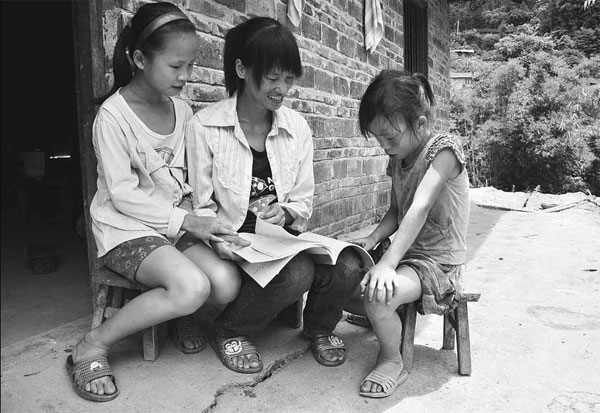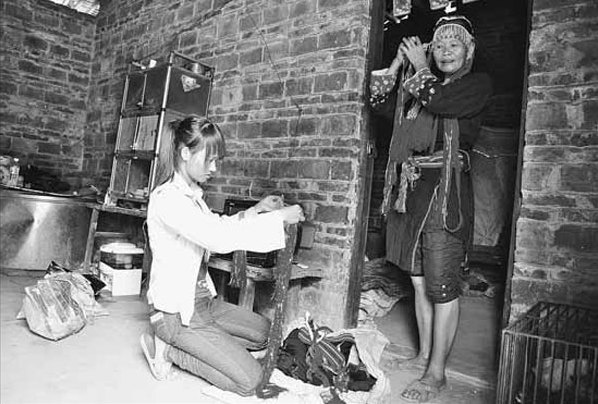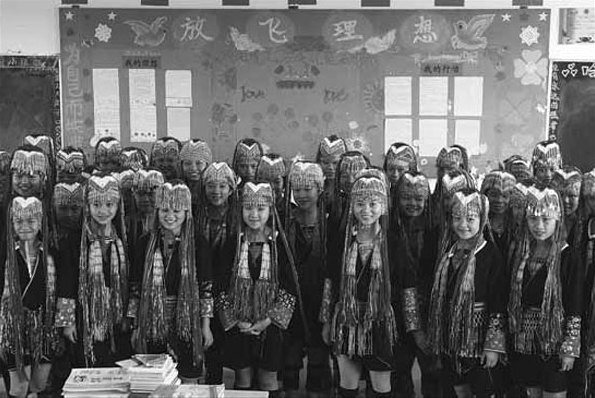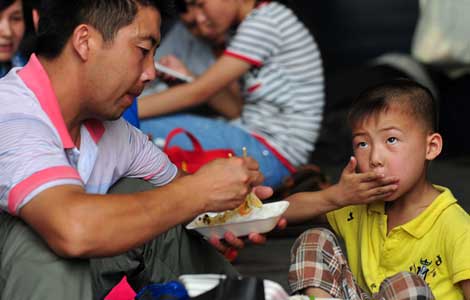Determined path
Updated: 2013-07-31 07:23
By Li Yang (China Daily)
|
||||||||
|
Zhao Xianyan teaches her two nieces with her textbook at home. Mo Jinmei / For China Daily |
|
Zhao Xianyan helps her mother put on the traditional costume of the Yao ethnic group. Mo Jinmei / For China Daily |
|
Class for girls of the Yao ethnic group in Nanping Town Ethnic Middle School in Shangsi county, the Guangxi Zhuang autonomous region. Huo Yan / China Daily |
Orphan Zhao Xianyan had the odds of getting an education stacked against her, but her foster family's commitment to her schooling saw the young woman become the first person in her village of 200 people graduate high school, Li Yang reports in Shangsi, the Guangxi Zhuang autonomous region.
While hundreds of thousands of high school graduates in China celebrated the end of the national college entrance exam, or gaokao, at various parties on the night of June 10, Zhao Xianyan, 21, was trudging her way home in darkness on the muddy mountain path alone from her exam school in Shangsi county of the Guangxi Zhuang autonomous region.
She needed to reach home as early as possible to help her foster mother do farm work and take care of the family.
It took her nearly four hours to reach home. She trudged back home every Friday evening like this after school, and then returned to the campus on Sunday night, carrying enough sweet potatoes and rice as her provisions for the next five days.
"Although it is already totally dark when I get home, I feel very happy because I can do two days of work for the family," she says.
Zhao, a Yao ethnic orphan raised by her uncle and aunt in Qukun village of Nanping Yao ethnic town of Shangsi, has every reason to take pride in her good school records starting from elementary school. She is the first high school graduate in the history of her village of 200 people.
Her foster parents raised her together with two sons and one daughter by planting one small field of banana trees they cultivated themselves in the mountains.
Zhao's three siblings work as migrant workers far from home after dropping out of elementary school.
Her uncle suffered a brain stroke several years ago in his 50s and lost consciousness. Her aunt's left eye was badly injured by a tree branch when she worked in the woods. The two accidents exhausted every penny of the utterly destitute family.
Zhao's parents died in an accident when she was 5.
"My foster parents treat me so well and dispel the shadow over an orphan's heart. They have encouraged me to study hard after finding I did well in my study," Zhao says, adding she had considered quitting school several times but was dissuaded by her foster parents.
Some teachers also offer a helping hand, Zhao adds. "I feel grateful to teacher Li at the education point. Whenever I recalled the image of him carrying our textbooks on his back to our mountain village from the town and walked about three hours on muddy footpath, I know no single second can be wasted in the classroom and each page of paper should be taken seriously."
Mo Jinmei, Zhao's primary school teacher who now works for Shangsi county government, says: "One big part of my job was to persuade Zhao to stay at school and give her knowledge that will change her fate. I felt she was worth my efforts."
Mo still remembers Zhao carrying several bunches of bananas to her office to thank for her concern. "I cannot imagine how she could walk for four hours on a muddy mountain path carrying the heavy fruits together with her weekly provisions. What I saw is a dark, thin, little girl standing at the door of my office, trembling out of fatigue, drenched in sweat and wearing a heartfelt smile on her face."
Zhao was enrolled in a class for girls of the Yao ethnic group in Nanping Middle School, an education program sponsored by government and private donators.
The program has been running since 2007, providing free middle school education and a living for ethnic Yao girls from Shiwan Mountains in the county.
Ling Yu, the school principal, says all teachers like teaching them because the girls are disciplined and extremely hard-working.
"They are shy, independent and considerate. Many of them would have married were it not for the program. As the saying goes in their villages, 'dogs do not cultivate land and girls do not read books'," Ling says. "They feel indebted to the society's donations and family's support. The school doesn't need to monitor their exams because they are very honest and do not cheat."
Yet, on June 25 when the entrance exam results came out, Zhao's score on the exam only allowed her to apply for a vocational school.
"I felt bad, because I disappointed my step-parents," Zhao says. "But I will continue to strive to realize my dream and become a teacher for the mountain villages one day."

Mo received Zhao's call in late June. "She has never left the county and would like me to help her to choose a teacher's school," Mo says. "Her voice sounds like it did five years ago when I met her. But when I saw her, I was astonished by how the hardship of life has shaped a young girl. An underdeveloped, thin, dark village woman stood in front of me."
"She saw my surprise and wore a shy smile on her face. She says after doing some farm work at home after gaokao, she helped one of her ailing sisters to cut trees and build a house with her family in the mountain. She says it so casually as if it was an easy job," Mo sighs.
Mo recommended that she apply for student loans to pay for the tuition fee in a local teacher's school. But the high living expenses in the city left Zhao pondering her future.
Contact the writer at liyang@chinadaily.com.cn.
Mo Jinmei and Yang Huihong contributed to the story.
(China Daily USA 07/31/2013 page10)
Most Viewed
Editor's Picks

|

|

|

|

|

|
Today's Top News
China-US talks yield 'incremental progress'
Spain investigators: Train driver was on phone
Apple faces more staff abuse charges
Spending surge for renewables
Beijing and Canberra to resume trade talks
Top leader vows to meet growth target
2,290 disciplined for extravagance
Japan diplomat seeks to mend ties
US Weekly

|

|


















